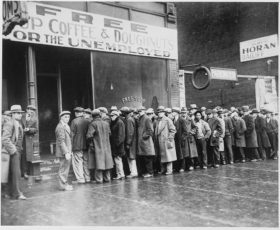“Use it up, wear it out, make it do, or do without.” ― Boyd K. Packer
The Great Depression era was a tragic period in history because of the devastating effects that it had on the economy, stock market, and banks. But what most people who lived through it remember the most about it is the shock of how quickly it all began.
In just one day, many folks lost their jobs and their entire life savings, which made it difficult for them to feed, clothe, and put a roof over the heads of their families. So, instead of starving and becoming homeless, this older generation had to budget and stretch the little resources that they had in order to survive.
This tough era helped to teach those of us who came after them the following important money-saving tips:
1. Reuse, Repurpose, or Repair –
A large number of things that are commonly thrown away can be made into new items. An example of this is the flour-sack dresses that women in the Great Depression made from the cotton sacks that flour came in at the time. This tactic for repurposing fabric that would have otherwise been wasted became so popular that when the flour-sack companies found out about it, they started offering different prints on the material of the sacks, so women could have something besides white dresses to wear. Learn how to sew so you can fix a button or seam to save that article of clothing instead of just throwing it away and buying a new one.
2. Don’t Waste Any Food –
Each year, tons of food is thrown away. Roughly one-third of the food produced in the world for human consumption (approximately 1.3 billion tons) gets lost or wasted each year. What makes this statistic so sad is that there are also millions of people who are starving who could have eaten it. A good majority of the food that goes to waste is fruits and vegetables that have small imperfections, which make them unsuitable for being sold in supermarkets. However, a lot of it is also consumer waste that could be prevented by Americans making smarter meal choices each day. Leftover vegetables, pasta, and meat scraps work great for soups and stews and pieces of odd-looking fruit are perfect for a fruit salad or baked in a dessert.
3. Make Your Own Cleaning Products –
Because of the constant advertising campaigns that consumers are exposed to many believe that the only way to get things clean is to use a ton of expensive chemical-laden products from the store. But in reality, most of them can be replaced with homemade versions. For example, a combination of vinegar, dish soap, and water can be put together in a spray bottle for cleaning windows, bathrooms, or even carpet stains.
Get Started With a Free Debt Analysis
We make it easy on mobile or desktop. FREE with no obligations.
4. Skip Disposable Products –
Another way that people who lived in this era stretched their budget was to avoid things that couldn’t be used more than once. This tip is especially important for people who tend to use a lot of paper plates and disposable cups, plastic utensils, and paper towels each day. Most of these items are not just wasteful, but they also become an unnecessary recurring cost that can be avoided. Here are some useful tips to stop using disposable plastics: https://www.llworldtour.com/5-tips-to-stop-using-disposable-plastics/
5. Find Free Sources of Entertainment –
One of the biggest money-saving tips to remember is to avoid wasting extra cash because of boredom when there are lots of free ways to entertain the family in most communities. Try heading to the library to check out a few books. Or take the kids to the park for a picnic on the weekends.
6. Don’t Buy What You Can’t Pay for With Cash –
Believe it or not, it is possible to save up for big-item purchases instead of going into debt for them. Many people in this era bought their first cars and houses in one lump sum instead of heading to the bank for a loan. The way they did it was often to stay with their close family members while they worked and put away cash.
Conclusion –
So, what’s the real “take away” from the money-saving lessons listed above? A little more work or prior thinking and preparation on your part equals savings! Even though we are used to an age of convenience and instant gratification where anything can be done for us, it can feel good to put a little elbow grease into your daily life. It will give you the feeling of achievement and it can put a little extra money in your bank account.
